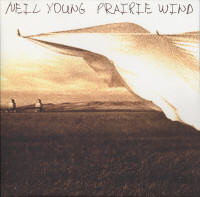|
You are reading the older HTML site
Positive Feedback
ISSUE
22
Prairie Wind, Neil Young
Classic Records' deluxe 200-gram LP of Neil Young's eagerly awaited album was released on the exact same day as the CD, begging the question, why'd it take so damn long for Greendale to appear on DVD-A? (Angry aside: If you want to know why DVD-A and SACD has not taken off, blame it on the major labels. If they would've put their new releases in the hands of companies like Classic, hi-res junkies might not already be looking ahead to Blu-ray.) But that's neither here no there because when an album like Prairie Wind gets the Classic Records treatment, it's easy to forget all about digital. No question, this LP is high-res in the best sense, with a warmth and presence that digital can only hint at. That's fitting, because Prairie Wind is Young's most personal album in years. It's inevitable that it would be compared to his 1972 classic, Harvest, but make no mistake: this is an older and wiser Young. By now, you've likely heard how this is Young's return to form, which is just a nice way of saying that misfires like 2002's clunky Are You Passionate and 2003's sometimes great, sometimes dull Greendale captured Young off his game. True, Young's catalog has been hit-or-miss for quite some time, but for me, the problem seems more like a lack of conviction. During the last decade, Young has seemed directionless, wandering from project to project and leaving each sounding like he'd grown bored halfway through. Even in the 1980s, when Young was at his strangest (as on 1983's synth-pop Trans) or his loudest (1981's hedonistically hard-rocking Re-Ac-Tor), he went all-in. That's why Prairie Wind is satisfying and confounding at the same time. There's a consistent earnestness here that's been missing, but it's not at all raw: the music under those affecting lyrics is slicker, smoother and ultimately more palatable because of it. The fan who inevitably screams, "Do ‘Heart of Gold!'" at every Young concert should like this a lot. Others may see it as Young growing up and maybe even selling out a little. No question, Young's best material of late hasn't gone down anywhere near as easy as this. Here, he's not railing noisily against injustice (as on 1989's Freedom), nor does he settle into the warmth of tuneful ramblers like those on Silver and Gold and Harvest Moon. Rather, he's reflecting on family, life, love and loss. Although I'm more often in agreement with Young's political views than against them, his protest songs and musings on societal ills too often sound like Billy Joel's rat-tat-tat rundown in "We Didn't Start the Fire" instead of Steve Earle's hastily recorded but brilliant album, The Revolution Starts Now, where stories of upheaval and injustice are seen through the eyes of real human beings. That's why I'm happy to see Young looking inward for (almost) an entire record. One or two tracks break rank (like the whimsical Elvis fan letter, "He Was The King"), but for the most part Young's lyrics are affecting and instantly relatable. The music never falls into a lulling country-rock dreamscape either; each track flows nicely into the next. Lush backing vocals are pierced by twangy guitar and the occasional harmonica solo in a way that evokes Johnny Cash's under-appreciated 1979 effort, Silver, which effectively contrasted the uncompromising Cash against a wall of newfangled sound that wasn't quite country but was interesting nonetheless. Classic's treatment of Prairie Wind is like stepping back in time to an era before music became a commodity that could be hacked into digitized chunks and traded for 99-cents per song. Inside the beautiful gatefold package is an LP-sized lyrics booklet along with two sets of sleeves: plain poly-lined paper (for actual record storage) and printed paper (for collecting). In keeping with the musical tone, it's not overly lavish or glossy, just right. The same is true of the mastering: it's warm but not overly sweet, with deeper, tighter bass than you have a right to expect from analog. As an additional bonus, side four features an in-depth interview with Young. All in all, this is a fantastic looking and sounding package. Fans who won't forgive Young for not repeating Harvest over and over again will find melancholic echoes of the past on Prairie Wind, but like all of Young's work this one stands on its own. More than any of his recent releases, it demands your full attention, and I can't think of a better way to enjoy it than by pulling out Classic's 200-gram vinyl on a chilly fall night. This version is dead quiet too, so there's nothing standing between you and the music but your expectations of what constitutes a great Neil Young album.
|

